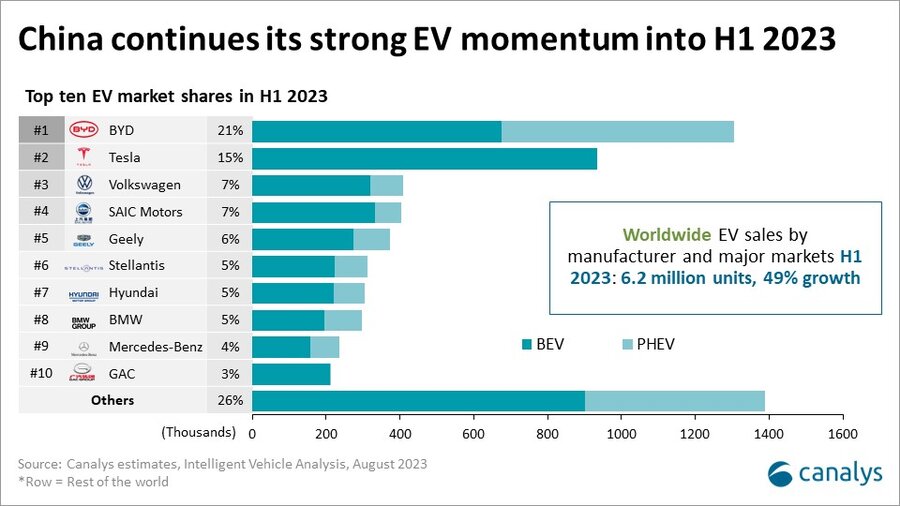International Expansion: BYD Aims For 50% Global Car Sales By 2030

Table of Contents
BYD's Current Global Footprint and Market Penetration
BYD's existing international presence is a crucial factor in its ambitious 2030 goal. The company has already made significant inroads into several key markets, including Europe, Southeast Asia, and Latin America. However, market penetration varies considerably across these regions.
-
Europe: BYD has seen notable success in several European countries, particularly Norway, where its EVs have gained significant traction due to favorable government policies and strong consumer demand for electric vehicles. However, competition from established European and Asian automakers remains fierce.
-
Southeast Asia: This region presents both opportunities and challenges. While there's strong potential for growth given the increasing adoption of EVs, navigating diverse regulatory environments and local preferences requires careful localization strategies.
-
Latin America: BYD is actively exploring opportunities in this market, focusing on countries with supportive government initiatives for green technologies and a growing middle class with increasing purchasing power.
Bullet Points:
- Successful launches in Norway and several other European countries have significantly boosted BYD's brand recognition and sales figures.
- Adapting to varying safety and emission regulations, as well as diverse consumer preferences regarding vehicle size and features, pose ongoing challenges.
- BYD's market share, while growing, still lags behind established players like Volkswagen and Tesla in many key regions. A focused competitive analysis is essential for targeted market penetration.
Key Strategies Driving BYD's International Expansion
BYD's ambitious 50% international sales target is underpinned by a multi-pronged strategy. This includes strategic partnerships, localization efforts, and targeted marketing campaigns designed to resonate with international audiences.
-
Strategic Partnerships: BYD is forging alliances with local distributors and governments to establish strong distribution networks and gain access to crucial resources and market insights. These partnerships are particularly important for navigating the complexities of international business and regulations.
-
Localization Efforts: Recognizing the importance of adapting to local needs, BYD is actively customizing its vehicle offerings to meet specific regional requirements. This includes modifications to vehicle design, features, and powertrain configurations to cater to the preferences and infrastructure of different markets.
-
International Marketing and Branding: BYD is investing heavily in marketing and branding campaigns tailored to individual markets. This involves understanding cultural nuances and adapting its message to appeal to different consumer demographics and preferences.
Bullet Points:
- Successful partnerships with local distributors in Europe have significantly expedited market entry and sales growth.
- Localization efforts, such as adapting charging port types and vehicle size to suit local infrastructure and preferences, are vital for market acceptance.
- BYD’s marketing campaigns are emphasizing its technological leadership and commitment to sustainability.
Challenges and Opportunities in BYD's Global Ambitions
While BYD's prospects are promising, its global expansion faces significant hurdles. However, equally compelling opportunities exist in the rapidly growing global EV market.
Challenges:
-
Global Competition: Intense competition from established automotive giants like Tesla, Volkswagen, and Hyundai poses a major challenge. These competitors possess strong brand recognition, established distribution networks, and considerable resources.
-
Supply Chain Vulnerabilities: Disruptions to the global supply chain, particularly concerning battery materials and components, could hinder production and impact sales targets.
-
Geopolitical Factors: Political instability, trade tensions, and regulatory uncertainties in different markets could negatively impact BYD's expansion plans.
Opportunities:
-
Growing Global Demand for EVs: The global transition towards electric mobility presents a significant opportunity for BYD. Governments worldwide are implementing policies encouraging EV adoption, creating favorable conditions for growth.
-
Government Incentives for Green Technologies: Many countries are offering substantial financial incentives to promote the adoption of electric vehicles, providing a competitive advantage for BYD.
-
New Market Entry: Untapped markets in developing economies with growing middle classes present significant potential for expansion.
Bullet Points:
- Competition analysis reveals that BYD needs to differentiate itself through innovative technology, competitive pricing, and a strong brand identity.
- Mitigating supply chain risks through diversification of sourcing and strategic partnerships is crucial.
- Government subsidies and supportive policies in several key regions will significantly accelerate BYD's market penetration.
Technological Innovation and Product Diversification
BYD's technological leadership is a key driver of its international expansion. Its advanced battery technology, efficient electric powertrains, and vertical integration strategy provide significant competitive advantages.
-
Battery Technology: BYD's Blade Battery technology offers enhanced range, safety, and energy density compared to traditional battery designs, making its vehicles more appealing to international consumers.
-
Electric Powertrains: BYD's efficient electric powertrains deliver superior performance and lower running costs, contributing to a stronger value proposition.
-
Product Diversification: Beyond passenger vehicles, BYD is expanding its international presence with electric buses, trucks, and energy storage solutions. This diversification strategy reduces reliance on a single market and mitigates risk.
Bullet Points:
- BYD's battery technology advancements are a core differentiator in a highly competitive EV market.
- The expansion into electric buses and trucks addresses growing demand for sustainable transportation in urban areas globally.
- BYD's entry into renewable energy storage complements its EV business, creating synergies and expanding its global reach.
Conclusion
BYD's ambitious goal of 50% international car sales by 2030 is a bold undertaking. While significant challenges remain, the company's technological prowess, strategic partnerships, and aggressive expansion plans position it for substantial global growth. Its success will hinge on effectively navigating the complexities of international markets, capitalizing on opportunities presented by the rapidly evolving EV landscape, and continuing its trajectory of innovation. To stay informed on BYD’s progress and its impact on the global automotive industry, continue to follow our coverage of BYD's international expansion.

Featured Posts
-
 523 Million Franchise Gets A Boost Gerard Butler Returns In Den Of Thieves 2
May 13, 2025
523 Million Franchise Gets A Boost Gerard Butler Returns In Den Of Thieves 2
May 13, 2025 -
 Pengalaman Sby Pendekatan Diplomasi Dalam Menangani Konflik Myanmar
May 13, 2025
Pengalaman Sby Pendekatan Diplomasi Dalam Menangani Konflik Myanmar
May 13, 2025 -
 Morgan Wallen Explains Sudden Exit From Saturday Night Live
May 13, 2025
Morgan Wallen Explains Sudden Exit From Saturday Night Live
May 13, 2025 -
 Experience Bar Roma A Blog To Perspective On This Toronto Hotspot
May 13, 2025
Experience Bar Roma A Blog To Perspective On This Toronto Hotspot
May 13, 2025 -
 Den Of Thieves 2 Netflix Streaming Status And Alternatives
May 13, 2025
Den Of Thieves 2 Netflix Streaming Status And Alternatives
May 13, 2025
